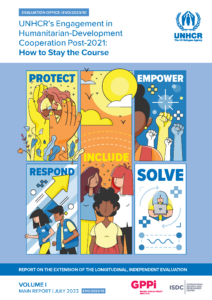Over a multi-year period, a team of experts from ISDC and GPPi evaluated the UNHCR’s engagement in humanitarian-development cooperation.
This comprehensive report provides an in-depth analysis of the organization’s efforts to address the needs of refugees and other displaced persons. The report is a follow-up to Phase 1 of the project, which included a longitudinal evaluation that was conducted between September 2018 and March 2021. Phase 2, which culminates in this report, was an extension that tracked how UNHCR has followed up on the Phase 1’s recommendations and presents new evidence on lessons learned, good practices, and the effects of humanitarian-development cooperation on refugees.
The report draws on interviews with 135 staff members working at headquarters, in regional offices, in UNHCR’s country operations in Kenya and Mauritania, as well as in other countries of operation. In order to understand the effects of humanitarian-development cooperation, the report presents rigorous statistical analysis on UNHCR datasets covering refugees in Jordan and refugees, stateless persons, and local residents in Kenya. The report also includes focus group discussions with refugees in Mauritania.
Key results highlight progress and gaps in recommendation follow-up, lessons on facilitating refugee inclusion in national service systems, and the effects of inclusion. The report aims to enhance UNHCR’s performance in addressing the needs of refugees and other displaced persons by providing a comprehensive analysis of the organization’s efforts and identifying areas for improvement.
Publication Details
- Year of Publication: 2023
- Region/s: Middle East & North Africa · Sub-Saharan Africa
- Theme/s: Human Development · Humanitarian Emergencies · Impact Evaluation
- Research Topic/s: Disasters & Emergencies · Employment · Migration & Displacement · Social Cohesion · Trust and Prosocial Behaviour






